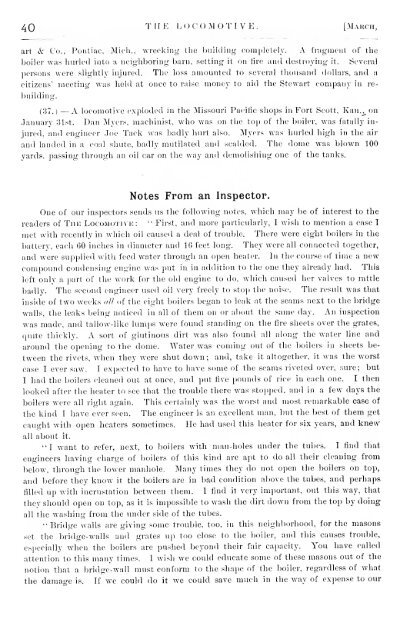The Locomotive - Lighthouse Survival Blog
The Locomotive - Lighthouse Survival Blog
The Locomotive - Lighthouse Survival Blog
You also want an ePaper? Increase the reach of your titles
YUMPU automatically turns print PDFs into web optimized ePapers that Google loves.
40 THE LOCOMOTIVE. [March,<br />
art & Co., Pontiac, Mich., wrecking the building completely. A fragment of the<br />
boiler was hurled into a neighboring barn, setting it on fire and destroying it. Several<br />
persons were slightly injured. <strong>The</strong> loss amounted to several thousand dollars, and a<br />
citizens' meeting was held at once to raise money to aid the Stewart company in re-<br />
building.<br />
(37.) — A locomotive exploded in the Missouri Pacific shops in Fort Scott, Kan.^^on<br />
January 31st. Dan Myers, machinist, who was on the top of the boiler, was fatally in-<br />
jured, and engineer Joe Tack was badly hurt also. Myers was hurled high in the air<br />
and landed in a coal shute, badly mutilated and scalded. <strong>The</strong> dome was blown 100<br />
yards, passing through an oil car on tbe way and demolishing one of the tanks.<br />
Notes From an Inspector.<br />
One of our inspectors sends us the following notes, which may be of interest to the<br />
readers of <strong>The</strong> <strong>Locomotive</strong>: " First, and more particularly, I wish to mention a case I<br />
met with recently in which oil caused a deal of trouble. <strong>The</strong>re were eight boilers in the<br />
battery, each 60 inches in diameter and 16 feet long. <strong>The</strong>y were all connected together,<br />
and were supplied with feed water through an open heater. In the course of time a new<br />
compound condensing engine was put in in addition to the one they already had. This<br />
left only a part of the work for the old engine to do, which caused her valves to rattle<br />
badly. <strong>The</strong> second engineer used oil very freely to stop the noise. <strong>The</strong> result was that<br />
inside of two weeks all of the eight boilers began to leak at the seams next to the bridge<br />
walls, the leaks being noticed in all of them on or about the same day. An inspection<br />
was made, and tallow-like lumps were found standing on the fire sheets over the grates,<br />
quite thickly. A sort of glutinous dirt was also found all along the water line and<br />
around the opening to the dome. Water was coming out of the boilers in sheets between<br />
the rivets, when they were shut down; and, take it altogether, it was the worst<br />
case I ever saw. I expected to have to have some of the seams riveted over, sure; but<br />
I had the boilers cleaned out at once, and jwt five pounds of rice in each one. I then<br />
looked after the heater to see that the trouble there was stopped, :md in a few days the<br />
boilers were all right again. This certainly was the worst and most remarkable case of<br />
the kind I have ever seen. <strong>The</strong> engineer is an excellent man, but the best of them get<br />
caught with open heaters sometimes. He had used this heater for six years, and knew<br />
all about it.<br />
"I want to refer, next, to boilers with man-holes under the tubes. I find that<br />
engineers having charge of boilers of this kind are apt to do all their cleaning from<br />
below, through the lower manhole. Many times they do not open the boilers on top,<br />
and before they know it the boilers are in bad condition above the tubes, and perhaps<br />
filled up with incrustation between them. I find it very important, out this way, that<br />
they should open on top, as it is impossible to wash the dirt down from the top by doing<br />
all the washing from the under side of the tubes.<br />
"Bridge walls are giving some trouble, too, in this neighborhood, for the masons<br />
set the bridge-walls and grates up too close to the boiler, and this causes trouble,<br />
especially when the boilers are pushed beyond their fair capacity. You have called<br />
attention to this many times. I wish we could educate some of these masons out of the<br />
notion that a bridge-wall must conform to the shape of the boiler, regardless of what<br />
the damage is. If we could do it we could save much in the way of expense to our
















